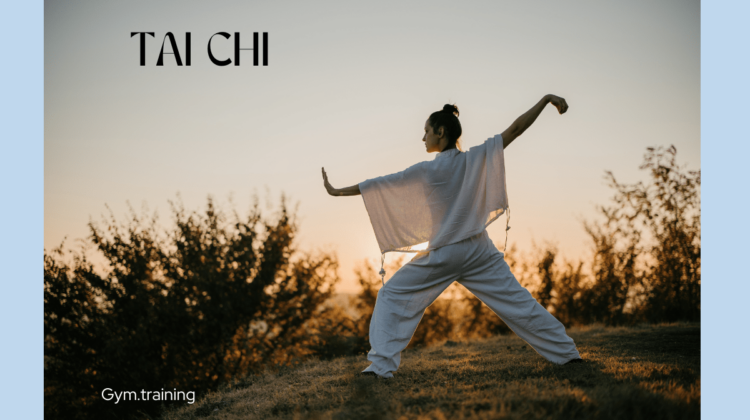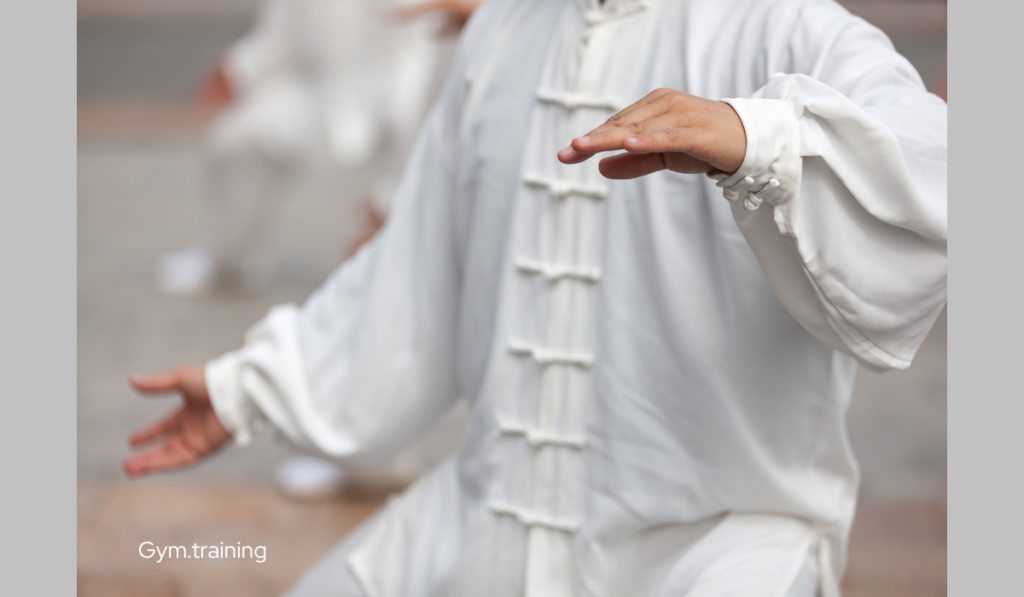
Introduction to Tai Chi
Tai Chi, often described as “meditation in motion,” is a graceful form of exercise rooted in ancient Chinese tradition. Originating centuries ago, this practice has evolved into a multifaceted art that encompasses physical, mental, and spiritual elements.
Its roots can be traced back to ancient China, believed to have been developed as a martial art.
Over time, it transformed into a gentle, flowing series of movements known for promoting balance and inner peace. The philosophy behind it revolves around the concept of Qi, the life force energy, and the balance between yin and yang style.
ALSO READ: 7 Most Effective Qigong Exercises Just For You
Benefits of Tai Chi
The practice of Tai Chi yields an array of benefits, both physical and mental. From improving cardiovascular health and flexibility to reducing stress and anxiety, its holistic approach contributes to overall well-being.
Studies have shown its effectiveness in alleviating chronic conditions, pain and enhancing cognitive function.
1. Physical Health Benefits
At its core, this is a low-impact exercise that engages the entire body. The slow, deliberate movements strengthen muscles, improve flexibility, and enhance balance and coordination.
This gentle yet powerful workout is particularly beneficial for older adults, aiding in fall prevention and improving joint health without the strain of high-impact exercises.
2. Mental and Emotional Well-being
Beyond physicality, this exercise cultivates mental clarity and emotional equilibrium. The focused, meditative aspects of the practice promote stress reduction, alleviating anxiety and depression.
Regular practitioners often report enhanced mood, increased resilience to stressors, and improved overall mental health.
3. Inner Peace and Relaxation
The rhythmic flow of movements in Tai Chi induces a state of tranquility, akin to a moving meditation. By syncing breath with motion, practitioners experience a sense of inner peace and mindfulness.
This meditative quality not only relaxes the body but also calms the mind, fostering a deep sense of relaxation and well-being.
4. Enhanced Focus and Concentration
The deliberate, mindful nature of this exercise requires full attention and concentration. Regular practice sharpens focus, heightens awareness, and improves cognitive function.
This mental discipline extends beyond the practice itself, enhancing concentration in daily activities and promoting mental clarity.
5. Stress Reduction and Resilience
Life’s challenges often create stress and tension. This exercise serves as a refuge, offering a space to release built-up stress and tension, allowing practitioners to build resilience and cope better with the demands of everyday life.
Its gentle movements and meditative qualities soothe the nervous system, promoting relaxation and restoring balance.
6. Boosted Immune System
Studies suggested that Tai Chi may strengthen the immune system. Its stress-reducing effects, combined with improved circulation and overall well-being, contribute to a more robust immune response, potentially reducing the risk of illness.
ALSO READ: 7 Ways To Calm Mind And Body Through Fitness
Tai Chi’s holistic approach to health and wellness positions it as more than just an exercise regimen. It embodies a lifestyle conducive to longevity, fostering not only physical health but also mental, emotional, and spiritual well-being.
These exercises aren’t merely a set of movements; it’s a gateway to holistic wellness. Its myriad benefits transcend the physical, enriching lives by nurturing harmony between the body and mind. Embrace the gentle yet profound art and embark on a transformative journey toward well-being.
Different Aspects Of Tai Chi

- Different Styles: Tai Chi is not a singular practice but comprises various styles, each with its unique characteristics. The Yang, Chen, Wu, and Sun styles differ in their pace, form, and emphasis on martial arts aspects.
- Basic Movements and Forms: At its core, it involves slow, deliberate movements coordinated with deep breathing. Practitioners learn tai chi sets of movements or forms of this exercise that flow seamlessly from one to the next, promoting balance, strength, and harmony within the body.
- Meditation Practice: Beyond its physical aspects, it serves as a meditation practice, fostering mindfulness and relaxation. Its gentle, rhythmic motions create a serene state of mind, allowing practitioners to enter a state of calmness and tranquility.
- Health and Wellness Aspects: For many, this serves as a holistic approach to health maintenance. It aids in stress reduction, enhances flexibility, and improves balance, making it especially beneficial for older adults to prevent falls and improve mobility.
- Aging: Its gentle nature makes this exercise accessible to people of all ages, with tailored adaptations for seniors. Studies highlight its role in reducing the risk of preventing falls in older adults and improving their overall quality of life.
- Myths and Misconceptions: There are misconceptions surrounding this, often portraying it as too slow or lacking physical benefits. However, practicing tai chi is that, when properly executed, can strengthen muscles and improve cardiovascular health.
Extra Points
- Modern Context: In recent years, Tai Chi has gained recognition in healthcare settings, integrated into treatment plans for various conditions due to its therapeutic benefits. Its popularity continues to grow in Western cultures, with many embracing its holistic approach to health.
- Other Martial Arts: While Tai Chi shares similarities with other martial arts, its emphasis on fluidity and relaxation sets it apart. Unlike more aggressive practices, Tai Chi focuses on internal strength and harmonizing mind and body.
- Research and Studies: Scientific studies showed the myriad health benefits of Tai Chi, showcasing its positive impact on physical and mental health. Ongoing research further explores its potential in various medical and wellness applications.
- Cultural Significance: Within Chinese culture, Tai Chi holds deep significance, embodying traditional principles of harmony and balance. Its global appeal transcends cultural boundaries, attracting people seeking a holistic approach to well-being.
- Personal Experiences and Testimonials: Countless individuals have experienced transformative effects through Tai Chi practice. Their stories serve as testimonials to its ability to improve health conditions, promote relaxation, and cultivate inner peace.
READ UP NEXT: The 5 Family Styles of Tai Chi
Interested individuals can explore Tai Chi through classes or online resources. Finding an experienced instructor or joining a community can provide guidance for beginners.
It stands as a profound testament to the synergy between physical activity or body movement, mental tranquility, and spiritual harmony. Its multifaceted nature offers a path toward holistic wellness, accessible to people of all ages and backgrounds.
Frequently Asked Questions
1. Is Tai Chi suitable for all ages?
Yes, it is adaptable and can be practiced by people of varying ages and fitness levels.
2. Can Tai Chi help with stress reduction?
Yes, the slow, deliberate movements promote relaxation and reduce stress.
3. How do I find a Tai Chi class near me?
You can search online or inquire at local fitness centers or community centers for Tai Chi classes.
4. Is Tai Chi a form of martial arts?
While it has martial arts origins, it emphasizes harmony, relaxation, and internal strength.
5. Are there different style of Tai Chi?
Yes, it has various styles like Yang, Chen, Wu, and Sun, each with unique characteristics

Leave a Reply
You must be logged in to post a comment.